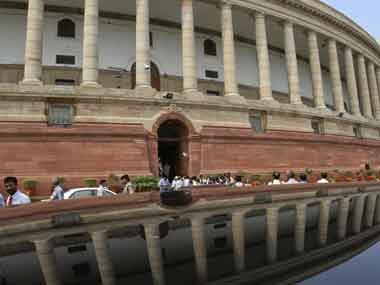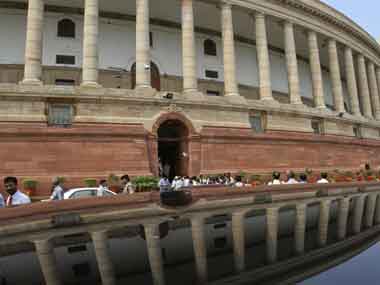The most striking thing about Indian parliamentary democracy is, of course, that it has lasted this long, given the numerous intimations of its mortality over the years. In 1967, for instance, barely 15 years after the first sitting of Parliament, Neville Maxwell, then the South Asia correspondent for The Times, wrote a series of articles on India’s “disintegrating democracy” – and prophesied that the fourth general election that year would prove to be India’s last. That downbeat assessment has, of course, proved to be spectacularly wrong, and decades later, Maxwell confided to me that he would “never forgive myself… (for) that arrogant mis-prophecy.” So, as our parliamentarians gathered on Sunday for a special sitting to commemorating 60 years of India’s parliamentary democracy, there was an air of self-congratulation, merely for having survived this long. With all the accoutrements of pomp and pageantry reserved for such milestone moments, MPs conducted themselves with grace and dignity. [caption id=“attachment_307730” align=“alignleft” width=“380” caption=“Mere survival of parliamentary democracy isn’t enough. Reuters”]
 [/caption] There is, of course, much to be proud of about the notion of India as one of the more enduring functioning democracies, particularly given the record of other countries in the South Asian region. Democracy is, as Churchill famously said, the worst form of government except for all those others that have been tried, and India’s record as a (largely) uninterrupted democracy in a neighbourhood given too readily to military interventions marks it as special. Over the decades, parliamentary democracy has also ‘tamed’ some of India’s most severe challenges to its unity and brought erstwhile fringe militant groups into the mainstream of Indian polity. Yet, if elected parliamentary democracy is seen not as a self-gratifying end in itself, but as a vehicle for the economic and social advancement of all of a country’s citizens, India’s record is less than admirable. More than 60 years after independence, India is home to the most shameful mass deprivation and poverty that belie (at least in spirit, even if not in letter) economic philosopher Amartya Sen’s famed assertion that “famines” do not occur in democracies. And if representative parliamentary democracy is really as good as it is made out to be, it would be hard to account for the fact that vast areas of India and its people remain under the sway of lawless Maoists and Naxalites and other pedlars of discredited ideologies. Just the fact that so many law-breakers – some of them for grievous crimes - get elected to Parliament and thrive there for years without the faintest bit of accountability shows up the repeated assertions about the supremacy of Parliament for the pious baloney that it is. And just the fact that recent publicly articulated criticism of parliament – which occasionally takes the form of vituperative abuse – enjoys enormous traction among a wide cross-section of civil society shows that parliamentary democracy, with all its faults, suffers from a serious crisis of credibility. In their moment of self-congratulation on Sunday, our parliamentarians did give themselves over to a brief nanosecond of introspection. Yet, the only flaw they could discern in themselves related to the frequent disruptions of parliamentary proceedings – to which they admitted. There is more, much more, that is flawed about our parliamentary democracy, and our Parliamentarians are in supreme denial if they refuse to acknowledge their failings. With all its dysfunctionalities, India’s democracy has much to commend, yet its inability or unwillingness to address its core failings is a tragedy that impedes India from realising its potential. The country and its people are paying an enormous a ‘democracy premium’ – just for the luxury of voting every few years to validate their faith in a parliamentary democracy. It is for parliamentarians to ensure that the ‘opportunity cost’ that the people are paying doesn’t go so high that Indians begin to question the very validity of the model.
[/caption] There is, of course, much to be proud of about the notion of India as one of the more enduring functioning democracies, particularly given the record of other countries in the South Asian region. Democracy is, as Churchill famously said, the worst form of government except for all those others that have been tried, and India’s record as a (largely) uninterrupted democracy in a neighbourhood given too readily to military interventions marks it as special. Over the decades, parliamentary democracy has also ‘tamed’ some of India’s most severe challenges to its unity and brought erstwhile fringe militant groups into the mainstream of Indian polity. Yet, if elected parliamentary democracy is seen not as a self-gratifying end in itself, but as a vehicle for the economic and social advancement of all of a country’s citizens, India’s record is less than admirable. More than 60 years after independence, India is home to the most shameful mass deprivation and poverty that belie (at least in spirit, even if not in letter) economic philosopher Amartya Sen’s famed assertion that “famines” do not occur in democracies. And if representative parliamentary democracy is really as good as it is made out to be, it would be hard to account for the fact that vast areas of India and its people remain under the sway of lawless Maoists and Naxalites and other pedlars of discredited ideologies. Just the fact that so many law-breakers – some of them for grievous crimes - get elected to Parliament and thrive there for years without the faintest bit of accountability shows up the repeated assertions about the supremacy of Parliament for the pious baloney that it is. And just the fact that recent publicly articulated criticism of parliament – which occasionally takes the form of vituperative abuse – enjoys enormous traction among a wide cross-section of civil society shows that parliamentary democracy, with all its faults, suffers from a serious crisis of credibility. In their moment of self-congratulation on Sunday, our parliamentarians did give themselves over to a brief nanosecond of introspection. Yet, the only flaw they could discern in themselves related to the frequent disruptions of parliamentary proceedings – to which they admitted. There is more, much more, that is flawed about our parliamentary democracy, and our Parliamentarians are in supreme denial if they refuse to acknowledge their failings. With all its dysfunctionalities, India’s democracy has much to commend, yet its inability or unwillingness to address its core failings is a tragedy that impedes India from realising its potential. The country and its people are paying an enormous a ‘democracy premium’ – just for the luxury of voting every few years to validate their faith in a parliamentary democracy. It is for parliamentarians to ensure that the ‘opportunity cost’ that the people are paying doesn’t go so high that Indians begin to question the very validity of the model.
Venky Vembu attained his first Fifteen Minutes of Fame in 1984, on the threshold of his career, when paparazzi pictures of him with Maneka Gandhi were splashed in the world media under the mischievous tag ‘International Affairs’. But that’s a story he’s saving up for his memoirs… Over 25 years, Venky worked in The Indian Express, Frontline newsmagazine, Outlook Money and DNA, before joining FirstPost ahead of its launch. Additionally, he has been published, at various times, in, among other publications, The Times of India, Hindustan Times, Outlook, and Outlook Traveller.
)